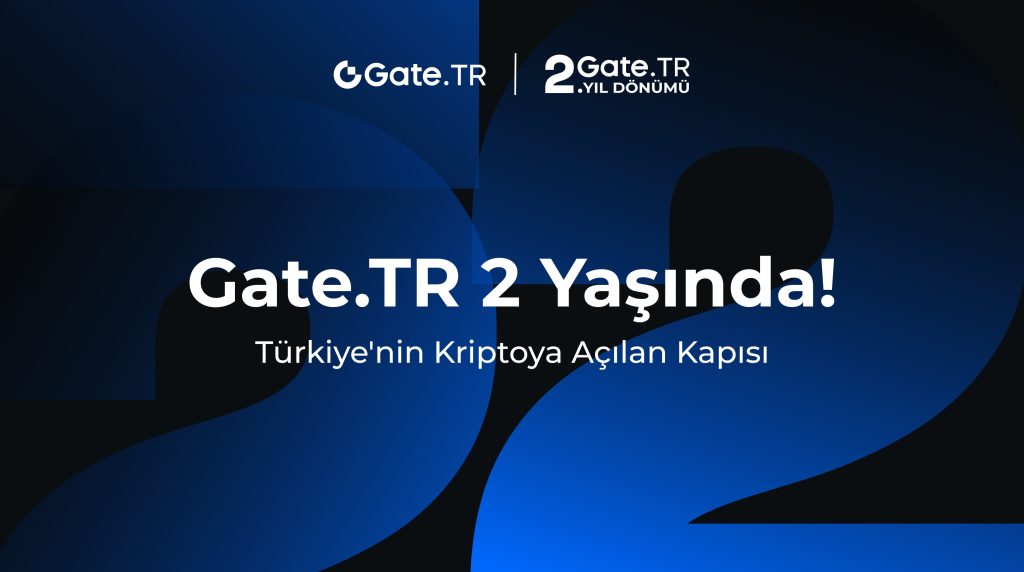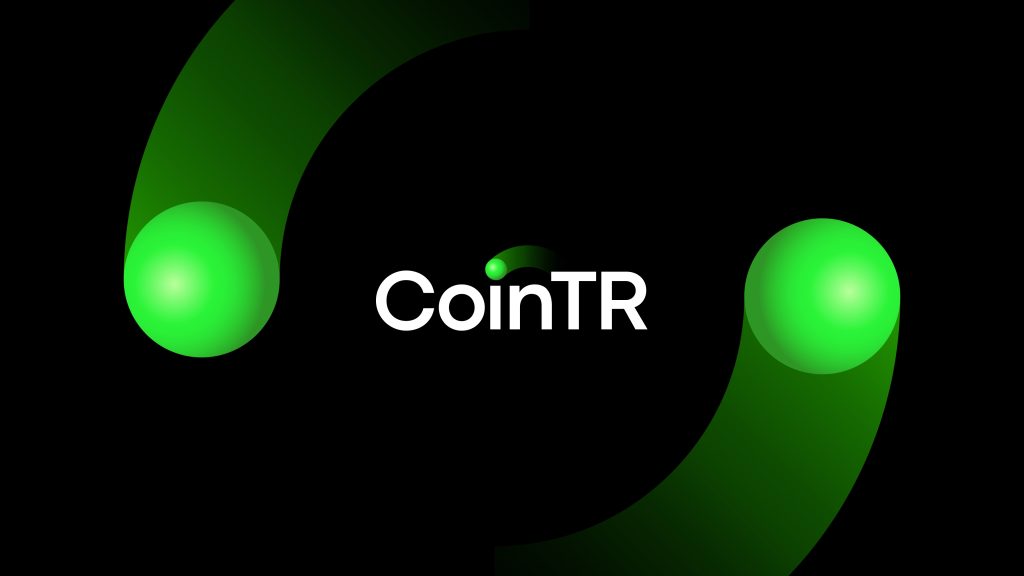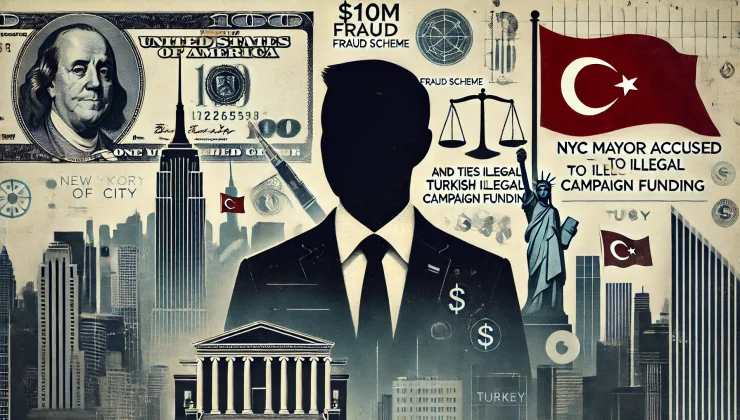
05 December 2024 Thursday

As a regional leader in cryptocurrency adoption, Turkey has become a hub for global players in the crypto industry. Recognizing Turkey’s potential early on and committing to full regulatory compliance from day one, cryptocurrency exchange Gate.TR is celebrating its second anniversary in Turkey.
Over the past few years, Turkey has distinguished itself as a leader in cryptocurrency adoption within the region, driven by widespread crypto acceptance and a dynamic blockchain community. Turkey’s appeal has caught the attention of global players, including Gate.TR, which has aligned its operations with the crypto regulations introduced on July 2. Marking its second year of operations in Turkey, Gate.TR has solidified its presence in the market.

Reflecting on their journey in Turkey, Gate.TR CEO Kafkas Sönmez stated:
“Turkey stands out among regional countries as a nation where the crypto ecosystem is vibrant and adoption is steadily rising. Over the past year, we’ve successfully adapted Gate.TR’s foundational values to align with Turkey’s dynamic market, delivering on our promise of full regulatory compliance since day one. It’s been a year of achievements, and we’re proud to celebrate these milestones.”
Highlighting the pivotal role of regulations in 2024, Kafkas Sönmez noted:
“Contrary to expectations, the implementation of the legal framework introduced on July 2—further clarified by the Capital Markets Board (SPK)—has only strengthened users’ embrace of crypto assets in Turkey. Since our inception, Gate.TR has pledged 100% regulatory compliance, worked collaboratively with authorities on legal matters, contributed to the legislative process, and effectively communicated these efforts to our users. This approach has been instrumental in our strong growth in 2024. From the start of the year, our user base has grown by 559%, while trading volumes have increased by 270%.”
Founded in 2022, Gate.TR offers over 200 trading pairs with the Turkish Lira. Reflecting on their success, Kafkas Sönmez said:
“In an increasingly competitive market, maintaining close contact with our users is paramount. Our Turkey team has been consistently accessible since day one, interacting with thousands of users daily via social media and hosting regular in-person events to engage with the community. This direct connection fosters trust at every level, and we owe much of our success in Turkey to this trust.”
Sönmez emphasized that Gate.TR’s communication strategies in Turkey revolve around trust and community:
“We see our investors not just as users but as friends. In a market like Turkey, characterized by a young population, high technology adoption, and strong interest in investment tools, we believe that conveying Gate.TR’s vision of the new financial world requires a genuine and community-oriented approach. Above all, innovation and technology must be communicated in clear, straightforward terms. Over the past two years, we believe we’ve achieved this in Turkey.”
Gate.TR has made extraordinary efforts to reach every corner of Turkey through physical and online events and community gatherings. Sönmez concluded:
“As GateTR, we close our second year with a strong community and a remarkable performance in brand recognition. In 2025, our focus will remain on innovation. Positioned as a gateway to crypto and decentralized finance, Gate.TR will continue to support crypto investors with an expert, active team and a loyal community that shares our passion for the ever-evolving blockchain ecosystem. Together, we look forward to a dynamic and successful year ahead.”

Celebrating its third anniversary, the local cryptocurrency exchange CoinTR has been announced as the Event Hall Sponsor for Turkey’s leading fintech conference. As part of its sponsorship, the Next Wave by CoinTR area will feature five sessions discussing Web3, blockchain, and cryptocurrency topics.
Set to gather stakeholders of Turkey’s financial technology ecosystem, the country’s leading fintech conference, Webrazzi Fintech 2024, is just days away. The Event Hall Sponsor for this year’s summit has been revealed as CoinTR, a cryptocurrency exchange celebrating its third year of operations. Scheduled for December 11, 2024, in Istanbul, the conference will spotlight blockchain, Web3, and crypto regulations through five sessions led by prominent figures in the crypto ecosystem.
Sharing insights about the sponsorship, CoinTR CEO Ali Eşelioğlu stated, “Webrazzi Fintech 2024 will, as always, present a comprehensive program, delving into the latest innovations in financial technologies with expert participants. As Turkey’s pioneering local cryptocurrency exchange, we are proud to host notable thought leaders of the ecosystem on the Next Wave by CoinTR stage to discuss the new era of finance and digital transformation, including blockchain and Web3.”

CoinTR, known for its “Secure Point of Crypto” motto, has become a leading representative of safe, transparent, and swift cryptocurrency trading. As the Event Hall Sponsor of Webrazzi Fintech 2024, CoinTR will establish the Next Wave by CoinTR space at the Wyndham Grand Istanbul Levent. The conference will explore the future of financial technologies in Turkey alongside global trends. Sessions will cover topics like crypto regulations, bull markets, digital asset custody technologies, the DeFi ecosystem, community building in Web3, and local Web3 startups, all organized with the support of CoinTR.
The sessions on the Next Wave by CoinTR stage will kick off with a panel featuring CoinTR CEO Ali Eşelioğlu, Solak Partners Partner Elçin Karatay, and Ussal Danışmanlık Managing Partner Ussal Şahbaz as the moderator. Throughout the day, over 20 speakers will shed light on various aspects of the crypto ecosystem, from DeFi and community-building to data security and artificial intelligence.
This year, Webrazzi Fintech 2024 is expected to host over 1,000 high-level participants, including directors, CEOs, co-founders, and executives from sectors like financial technology, banking, e-commerce, and retail. Taking place on December 11 at Wyndham Grand Istanbul Levent, the event will include the Next Wave by CoinTR stage, welcoming hundreds of attendees. Participants will also have the chance to experience CoinTR’s wide range of cryptocurrency products and services, which facilitate easy trading.

Since its launch in 2022, CoinTR has celebrated its third anniversary as a notable player on the Capital Markets Board’s Active Entities List. With crypto regulations gaining clarity in Turkey in the latter half of 2024, CoinTR has pursued an ambitious growth strategy. Before entering 2025, the company has revamped its brand identity with the principle of “a secure and solid framework for all.”
Built on values such as innovation, transparency, integrity, and user-centricity, CoinTR’s refreshed corporate identity aims to position the platform as a leader in the new era of cryptocurrency in Turkey. It strives to establish seamless accessibility and lasting connections, creating a powerful impact on the sector.

CoinTR’s leadership team includes industry veterans such as former Deputy Minister of Treasury and Finance and former Chairman of the Savings Deposit Insurance Fund (TMSF) Şakir Ercan Gül, former Deputy General Manager of Markets at the Central Bank of the Republic of Turkey (CBRT) Ali Eşelioğlu, former CBRT Governor Murat Uysal, former Vakıfbank Deputy General Manager Mehmet Emin Karaağaç, and former Banking Regulation and Supervision Agency (BDDK) official Yakup Demir.


If this summer was defined by the return (or rather the lack) of AI-driven ROI, Wall Street is now gearing up for tech’s fall earnings with mixed expectations. Despite the surge in semiconductor stocks, which hints at investor optimism, there’s still plenty of uncertainty surrounding when the infrastructure spending tied to AI will translate into real revenue. For now, investors are left waiting, as the rising value of chip companies buys executives some time.

With analysts increasingly pressing tech leaders for concrete timelines on the AI revolution, chip stocks are seeing renewed gains. Nvidia, once again vying with Apple for the title of the world’s most valuable company, has led the charge. Semiconductor stocks, which saw a decline in August, are rebounding. This renewed momentum is further buoyed by Taiwan Semiconductor Manufacturing Company (TSMC), which reported strong AI-driven sales projections on Wednesday.
This highlights the significant demand for AI processing power and infrastructure, as well as the market’s willingness to overlook short-term concerns about rising capital expenditures (capex). Chasing the AI dream is undoubtedly costly, but the question on everyone’s mind is how long this enthusiasm will last—and if there’s a breaking point.
As third-quarter earnings reports approach, these questions loom larger. With tech companies projected to invest $215 billion in AI-related capex this year, and forecasts suggesting $250 billion by 2025, the stakes have never been higher. Investors will be looking for signs that these investments are yielding results, though the real test may come when those “innovative AI use cases” need to translate into measurable productivity gains.
The tight-knit ecosystem of AI hardware sales further complicates the picture. If major tech players decide to pull back on spending or shift focus, what has been a boom for chipmakers could quickly unravel.
Last quarter, tech giants largely disappointed Wall Street, with the exception of Meta. Alphabet, Microsoft, and Amazon all faced investor skepticism due to the burdens of their heavy AI investments. In contrast, Mark Zuckerberg’s Meta was able to convince the market that rising capex is manageable—so long as the rest of the business is performing exceptionally well. But that’s a high bar, and it’s only getting higher as capex balloons without immediate revenue to justify it.
For the tech titans, maintaining a long-term vision is key. Leaders at the helm of these companies are betting big on AI, determined to push forward despite market anxieties. If the rally in chip stocks is any indication, investors are still on board—for now. But as the pressure mounts, patience could wear thin without more concrete answers about when AI will deliver on its promises.


New York Mayor Eric Adams is facing serious allegations involving bribery and illegal campaign financing related to his 2021 mayoral run, according to an indictment released by the U.S. Attorney’s Office for the Southern District of New York. The indictment claims that Adams fraudulently secured over $10 million in public funds by submitting false documentation as part of his campaign finance reports.

The charges allege that Adams accepted luxury international travel provided by Turkish Airlines at no cost, sponsored by at least one official from the Turkish government. These trips, which allegedly included destinations such as France, China, Sri Lanka, India, Hungary, and Turkey, were arranged by the Turkish national carrier and included complimentary stays in high-end hotels, meals at upscale restaurants, and other luxury perks during his visits.
A central claim in the indictment involves “straw donors” — individuals who illegally use another person’s money to make political donations in their own names. Adams is accused of accepting illegal campaign contributions through these intermediaries, which were then falsely documented as legitimate donations. Some of these straw donors are said to have also provided other inappropriate benefits to Adams, such as luxury gifts and additional perks.
The indictment further claims that Adams used his influence to assist a Turkish diplomat, who allegedly played a key role in facilitating these illegal donations. This diplomat reportedly helped arrange for Adams and his associates to receive free or discounted travel. In return, it is alleged that Adams applied pressure on the New York Fire Department (FDNY) to bypass fire safety inspections for the opening of the Turkish consulate building, known as the “Turkevi,” in Manhattan. According to the U.S. Attorney’s Office, Adams reportedly told the Turkish official after these favors, “Now it’s my turn to repay you.”

A particularly striking allegation is that Adams exerted influence on FDNY officials, allegedly threatening the job of the officer responsible for the building’s fire safety evaluation if the Turkevi’s opening was delayed. As a result, the building opened without undergoing the required fire inspections.
The indictment also highlights the misuse of New York City’s public matching funds program. This program is designed to amplify small donations from city residents by matching them with public funds, up to eight times the original contribution. The indictment accuses Adams of submitting fraudulent documentation based on illegal donations, thereby securing $2,000 in matching public funds for each illegal contribution. Ultimately, this scheme allowed Adams to amass over $10 million in public funding during his campaign.
The case, which is still unfolding, has raised significant questions about the integrity of Adams’ 2021 mayoral campaign and the broader implications of foreign influence and campaign finance violations in U.S. elections.